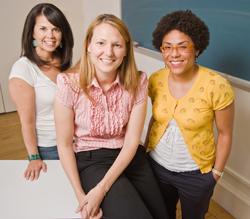Helping the Best Learn from Each Other
The Cahn Fellows Program matches top NYC principals up with the best teachers: their peers
Most professional development programs—whether in education or any other field—market themselves as offering knowledge their enrollees lack, and are therefore willing to pay for.
The Teachers College Cahn Fellows Program for Distinguished New York City Principals takes the opposite tack.
“We pay for our Fellows to come here, and the assumption is that they have all the knowledge,” says Krista Dunbar, Program Director. “Our role is to support them in sharing that knowledge with each other. We offer them guidance, but based on what they identify as their needs, rather than what we assume those needs to be.”
That makes a lot of sense when you consider that the Cahn Fellows are the best of the best—top
Both the challenges and the approaches devised to meet them are wide-ranging. For example, Cahn Fellow Patricia Minaya, principal of the Urban Assembly School of Business for Young Women, has implemented a “100 Percent Respect” campaign to address what she saw as a lack of basic politeness and mutual respect among both students and teachers at the school.
“We’re a new school, so it’s really important that we get that ethos in place in our culture,” Minaya says.
At the Millennium Art Academy, Principal Maxine Nodel has worked on setting and maintaining strong expectations—both academically and socially—for her students, who share with five other schools the building on the Adlai E. Stevenson Campus in the Bronx.“
Some of the other schools in the building have had performance and behavior issues with their students, and with no geographic boundary between them and us, it becomes especially important to set standards,” Nodel says. “That’s a growing issue around the city, as more and more campuses house multiple schools.”
“That’s a key age group, because it’s been shown that when students don’t earn enough credits coming out of the ninth grade, they’re much more likely to drop out later on,”
Cahn Fellows also select and mentor new principals, known as Cahn Allies—and many serve as mentors through other programs as well. (For example, nine of 10 mentors in a
“One of the major premises of the Cahn Fellows Program is that principals need a safe space where they can come together and speak freely,” says Dunbar, who previously taught at Frederick Douglas Academy in Manhattan, after which she earned an M.B.A. from Baruch College and worked as a market research analyst. “And that’s as important for our alumni as for our current Fellows, because these are jobs where typically no one is going to pat you on the back, either above you or on your own staff.”
In fact,
Program coordinator Kristin Jefferson has taken on an initiative to help current and former Fellows recruit teachers by posting job listings in their schools on the program Web site. And in their efforts to build a sense of community among present and former Fellows, Dunbar and her team—Jefferson and graduate assistant Kathleen Hayes and—also are creating a database of the research projects conducted by Fellows during the program. Hayes, a doctoral student in TC’s Leadership, Policy and Politics program who previously taught high school English in Chicago, currently is cataloguing all past projects across five categories—school culture, professional development, parental involvement, curriculum and instruction, and distributed leadership.
“We want each new cohort to be able to learn from work that’s already been done,” Hayes says. “Because our Fellows really do have a huge amount of knowledge, so there’s no reason for anyone to reinvent the wheel.”
Published Friday, Jun. 15, 2007
